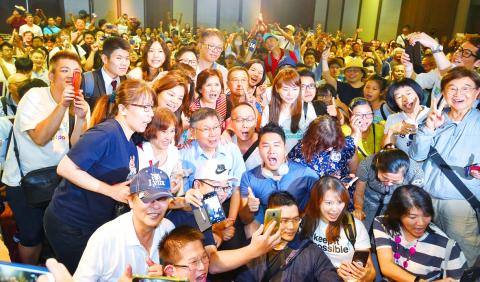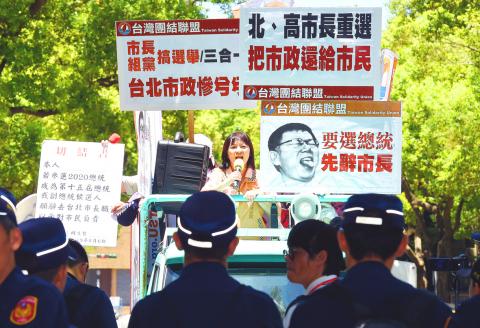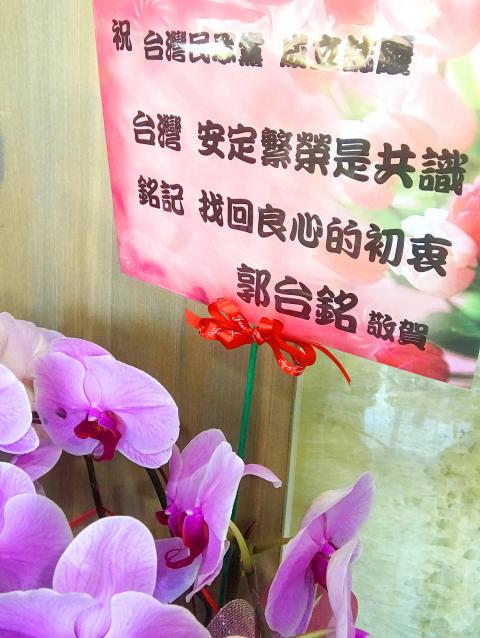The Taiwan People’s Party (台灣民眾黨, TPP) was formally established yesterday in Taipei, with the party announcing its constitution and the election of Taipei Mayor Ko Wen-je (柯文哲) as its chairman.
The founding ceremony was held at the National Taiwan University Hospital International Convention Center, with hundreds of people attending.
Ko arrived shortly past noon and was welcomed by enthusiastic chants of: “Taiwan’s choice — Ko Wen-je,” “The best choice — Ko Wen-je” and “The party members’ choice — Ko Wen-je” — similar to the slogans used during his mayoral re-election campaign last year.

Photo: Liu Hsin-de, Taipei Times
The party has 111 founding members, with 72 attending the morning meeting to decide the party’s constitution and elect a chairman, a cohost of the event said.
The founding members include members of the Ko administration — adviser Tsai Pi-ju (蔡壁如), Secretary-General Chang Jer-yang (張哲揚), spokesman Liu Yi-ting (劉奕霆) and deputy spokespeople Ke Yu-an (柯昱安) and Huang Ching-ying (黃?瑩) — and Taipei Rapid Transit Corp (台北捷運) chairman Lee Wen-tsung (李文宗).
Ko said that the TPP was founded to change Taiwan’s political culture, as the ideological battle between the two major parties has left the nation in a rut and led to friction over the past two decades.

Photo: Liao Chen-huei, Taipei Times
He said that his foremost principle is to promote the nation’s “general interests and the public’s maximum well-being.”
The biggest problem that Taiwanese politics has faced since 2000 is the destruction of the civil service system, because policies can be suddenly changed by political forces, without professional and technical discussions, unlike the past when there were technocrats, he said.
“While honesty and diligence should be basic requirements of government, they have become rare in today’s Taiwan,” he said, adding that the government needs to improve governance, regain the public’s trust and highlight the nation’s value to the world with a graft-free government.

Photo: CNA
Ko reiterated that he believes “Taiwanese values” are the implementation of universal values in Taiwan, including democracy, freedom, diversity, openness, rule of law, human rights, caring for the underprivileged and sustainable development.
“The TPP we established today is the coming together of ideas. We are not political leaders, but rather hope to become preachers of culture,” he said.
Public opinion, professional expertise and values are the three most important elements in decisionmaking, he added.
According to the party’s charter, the TPP conforms to the existing constitutional system and aims to strengthen national governance, enhance national interest and abolish corruption.
It will take a practical approach in foreign relations to ensure Taiwan’s survival and protect its sovereignty, it says.
Hon Hai Precision Industry Co (鴻海精密) founder Terry Gou (郭台銘) and Chinese Nationalist Party (KMT) Legislator Wang Jin-pyng (王金平) sent flowers to congratulate the party on its founding.
Gou’s gift came with a card that says: “Remember the reason it all started. It is our shared goal to ensure Taiwan’s stability and prosperity.”
Wang’s gift came with a message calling for solidarity to ensure peace and stability for Taiwan.
Gou’s and Wang’s gifts were the only flower baskets placed at the entrance of the venue.
Yonglin Education Foundation chief executive officer Amanda Liu (劉宥彤), a member of Gou’s campaign team, said she attended the event in her personal capacity to offer the party her best wishes.
The event coincided with Ko’s 60th birthday, and the mayor’s parents attended the event, where supporters shouted “Happy birthday” to Ko.
Outside the venue, several members of pro-independence groups and self-styled “Ko haters” staged a rally and called on Ko to resign as mayor if he runs for next year’s presidential election.
Additional reporting by Ann Maxon

MAKING WAVES: China’s maritime militia could become a nontraditional threat in war, clogging up shipping lanes to prevent US or Japanese intervention, a report said About 1,900 Chinese ships flying flags of convenience and fishing vessels that participated in China’s military exercises around Taiwan last month and in January last year have been listed for monitoring, Coast Guard Administration (CGA) Deputy Director-General Hsieh Ching-chin (謝慶欽) said yesterday. Following amendments to the Commercial Port Act (商港法) and the Law of Ships (船舶法) last month, the CGA can designate possible berthing areas or deny ports of call for vessels suspected of loitering around areas where undersea cables can be accessed, Oceans Affairs Council Minister Kuan Bi-ling (管碧玲) said. The list of suspected ships, originally 300, had risen to about

DAREDEVIL: Honnold said it had always been a dream of his to climb Taipei 101, while a Netflix producer said the skyscraper was ‘a real icon of this country’ US climber Alex Honnold yesterday took on Taiwan’s tallest building, becoming the first person to scale Taipei 101 without a rope, harness or safety net. Hundreds of spectators gathered at the base of the 101-story skyscraper to watch Honnold, 40, embark on his daredevil feat, which was also broadcast live on Netflix. Dressed in a red T-shirt and yellow custom-made climbing shoes, Honnold swiftly moved up the southeast face of the glass and steel building. At one point, he stepped onto a platform midway up to wave down at fans and onlookers who were taking photos. People watching from inside

Japan’s strategic alliance with the US would collapse if Tokyo were to turn away from a conflict in Taiwan, Japanese Prime Minister Sanae Takaichi said yesterday, but distanced herself from previous comments that suggested a possible military response in such an event. Takaichi expressed her latest views on a nationally broadcast TV program late on Monday, where an opposition party leader criticized her for igniting tensions with China with the earlier remarks. Ties between Japan and China have sunk to the worst level in years after Takaichi said in November that a hypothetical Chinese attack on Taiwan could bring about a Japanese

The WHO ignored early COVID-19 warnings from Taiwan, US Deputy Secretary of Health and Human Services Jim O’Neill said on Friday, as part of justification for Washington withdrawing from the global health body. US Secretary of State Marco Rubio on Thursday said that the US was pulling out of the UN agency, as it failed to fulfill its responsibilities during the COVID-19 pandemic. The WHO “ignored early COVID warnings from Taiwan in 2019 by pretending Taiwan did not exist, O’Neill wrote on X on Friday, Taiwan time. “It ignored rigorous science and promoted lockdowns.” The US will “continue international coordination on infectious